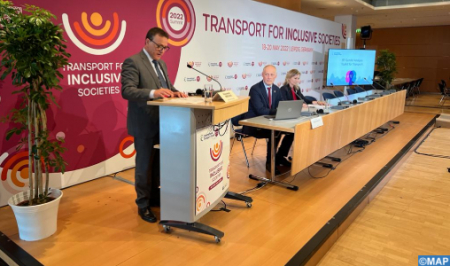The Summit of the International Transport Forum (ITF), held in Leipzig, Germany, under the presidency of Morocco, highlighted the role of transport in the development of inclusive societies.
The various debates that took place during this international meeting focused on how to promote universal access to transport so that “no one is left behind” and on how policymakers can act across sectors to achieve an accessible, affordable, efficient, clean and safe mobility system that includes all economic strata of society.
In view of the acceleration of urbanization in the world, as 68% of the world’s population will live in cities by 2050, according to the UN, speakers at the event, including ministers, presidents of international organizations, as well as political, economic and civil society stakeholders, examined mobility planning strategies to provide access to existing and future peripheral urban settlements.
The participants also considered transport innovation to promote equity and inclusion in urban, rural and remote communities.
“For this year, we have chosen to highlight the importance of transport in the development of inclusive societies and explore how innovative solutions, whether technological or commercial, can foster social inclusion and thus work towards achieving sustainable economic growth,” Moroccan Minister of Transport and Logistics, Mohamed Abdeljalil noted, speaking in his capacity as Summit Chair.
Inclusion is an issue that involves all components of society, policymakers, economic actors and representatives of civil society, as it is a comprehensive and multidimensional approach that aims to ensure equal access and without discrimination to economic, social and cultural activities, he added.
Therefore, “our public policies must rethink our transport systems and reinvent them to turn them into systems that serve the economic, social and cultural inclusion of people and territories,” the minister continued.
According to Abdeljalil, “accessible transport to all helps to reduce social inequalities, promotes socio-professional integration and enables vulnerable and fragile people to contribute to and benefit from the dynamics of the territories.”
“What is certain is that equitable access to transport services is an essential condition for each of us to fully enjoy our fundamental rights such as employment, health, education and culture. Those who are deprived of it are simply threatened with exclusion,” he said.
It is therefore important for all of us to invest together in the implementation of appropriate transport policies and to anticipate trends and changes, the minister said.
The three-day event, which brings together delegations from some 80 countries, features more than 80 sessions and side events with a view to exploring various aspects of the theme of inclusion: from connectivity for rural communities to the digital divide, from workforce diversity in the transport sector to inclusive planning and design.
